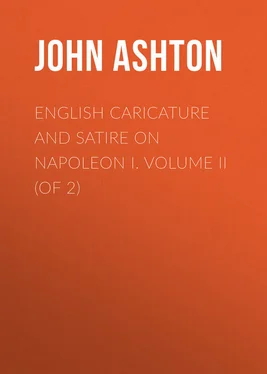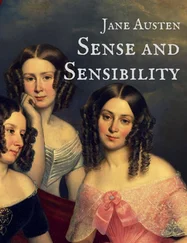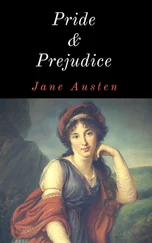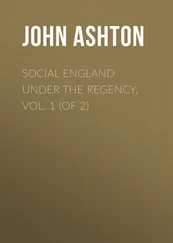John Ashton - English Caricature and Satire on Napoleon I. Volume II (of 2)
Здесь есть возможность читать онлайн «John Ashton - English Caricature and Satire on Napoleon I. Volume II (of 2)» — ознакомительный отрывок электронной книги совершенно бесплатно, а после прочтения отрывка купить полную версию. В некоторых случаях можно слушать аудио, скачать через торрент в формате fb2 и присутствует краткое содержание. Жанр: foreign_antique, foreign_prose, на английском языке. Описание произведения, (предисловие) а так же отзывы посетителей доступны на портале библиотеки ЛибКат.
- Название:English Caricature and Satire on Napoleon I. Volume II (of 2)
- Автор:
- Жанр:
- Год:неизвестен
- ISBN:нет данных
- Рейтинг книги:4 / 5. Голосов: 1
-
Избранное:Добавить в избранное
- Отзывы:
-
Ваша оценка:
- 80
- 1
- 2
- 3
- 4
- 5
English Caricature and Satire on Napoleon I. Volume II (of 2): краткое содержание, описание и аннотация
Предлагаем к чтению аннотацию, описание, краткое содержание или предисловие (зависит от того, что написал сам автор книги «English Caricature and Satire on Napoleon I. Volume II (of 2)»). Если вы не нашли необходимую информацию о книге — напишите в комментариях, мы постараемся отыскать её.
English Caricature and Satire on Napoleon I. Volume II (of 2) — читать онлайн ознакомительный отрывок
Ниже представлен текст книги, разбитый по страницам. Система сохранения места последней прочитанной страницы, позволяет с удобством читать онлайн бесплатно книгу «English Caricature and Satire on Napoleon I. Volume II (of 2)», без необходимости каждый раз заново искать на чём Вы остановились. Поставьте закладку, и сможете в любой момент перейти на страницу, на которой закончили чтение.
Интервал:
Закладка:
Gillray gives us a veritable caricature in ‘News from Calabria! Capture of Buenos Ayres! i.e. the Comforts of an Imperial Dejeune at St. Clouds’ (September 13, 1806), a portion only of which is given in illustration. Boney is here, terrific in his wrath; poor Talleyrand, who has brought the news, is receiving grievous punishment from his Imperial master. Not only is his ear pulled (a favourite trick of Napoleon’s), but he is being belaboured with the tea-urn, which is made in the form of the world: his master crying out: ‘Out on ye Owl, noting but song of Death!!’ Napoleon has kicked over the breakfast-table, and the scalding contents of the tea-urn are being deposited in the lap of Josephine, who screams with agony and terror. The maids of honour and courtiers, though refraining from open demonstration, look aghast at the imperial violence, which is not diminished by the presence of a number of messengers, whose news is particularly unwelcome: ‘Spain in despair for the loss of her Colonies.’ ‘All Germany rising, and arming en Masse .’ ‘Holland starving, and ripe for a revolt.’ ‘St. Petersburg: refusal to ratify the French Treaty.’ ‘Prussia rousing from the Trance of Death.’ ‘Swedish defiance. Charles XII. redivivus.’ ‘Switzerland cursing the French yoke.’ ‘Italy shaking off her Chains.’ ‘La Vendée again in motion.’ ‘Portugal true to the last gasp.’ ‘Sicily firing like Etna.’ ‘Denmark waiting for an opportunity.’ ‘Turkey invoking Mahomet.’ Naturally, all this bad news contributes towards making it a ‘hard time’ for Talleyrand.
Argus gives us (September 1806) ‘The Continental Shaving Shop. Boney beats Jemmy Wright, who shaved as well as any man, almost, not quite’ (September 1806). As a barber, he is going to shave the Grand Turk, and, flourishing an enormous razor of Corsican steel, seizes his beard. This the Turk naturally objects to, saying: ‘By the Holy Prophet, I must not part with my beard, why, my people will not acknowledge me for the grand Signor again at Constantinople.’ Talleyrand, as assistant, is lathering the Turk’s face, persuading him, ‘Come, come, don’t make such a fuss, my Master will cut away when he catches anybody in his shop.’ Boney calls out: ‘Lather away Talley. I’ll soon ease him of his superfluities and make him look like my Christian customers.’
The sort of treatment they are likely to get is clearly set forth in an announcement on the wall. ‘Nap Boney, shaver general to most of the Sovereigns on the Continent, shaves expeditiously, and clean, a few gashes excepted; is ready to undertake any new Customer who is willing to submit to the above.’ His treatment is exemplified by the appearance of Austria, whose gashed face and head is ornamented with strips of court-plaister. He is talking to John Bull, who looks in at a window: ‘Come, Johnny, come in and be shaved, don’t be frightened at the size of the razor, it cuts very clean, I assure you.’ His reply is, ‘By Goles so it seems, and leaves a dom’d sight of gashes behoind, as you and Mynheer can testify!!’ Poor Holland is in even a worse plight than Austria, and is talking to Prussia, who is sitting in a chair, ready lathered for shaving. Says he to the Dutchman: ‘I hope he don’t mean to shave me as he has you, and my neighbour Austria there? I should not sit here so quietly with my face lathered.’ Holland replies: ‘Yaw Mynheer very close shaver, its nix my doll when you are used to it.’
‘Political Quadrille’ is by Ansell (October 1806), and represents two sets playing that game of cards. One set is composed of George the Third, Russia, Spain, and Prussia. The other consists of Napoleon, Italy, Holland, and Austria. George the Third says: ‘I never had luck when the Curse of Scotland 15 15 The nine of diamonds.
was in my hand – however I have now discarded it – Ay this will do – I have now a strong suit, without a knave among them.’ Russia observes: ‘I never had such luck since I have been a Russian, compleatly bested off the board – but that I must endeavour to forget, and try to play better in future.’ Spain says: ‘I was obliged to play, tho’ it was forced Spadille . My Queen deceived me – but however I must not now give myself Ayres , as I have lost all my Dollars.’ Prussia remarks: ‘Shall I play or not? If I play, I fear I shall be bested, and if not, they will call me Prussian Cake .’
In the other set of players, Napoleon says: ‘I begin to fancy I can play alone – No, I can call a King when I please, I am strong in my suits – besides I know how to finesse my Cards.’ Austria says: ‘For the present I fear the game is up with me, so I pass .’ Italy says: ‘I fear it is nearly over with poor Ponto .’ Holland reflects: ‘I have got a King without calling one – but I have no Trump now, and I fear I shall lose all my fish.’
Fox died in September 1806, and was buried, October 10, in Westminster Abbey, close to the remains of his rival Pitt. With him were buried the last hopes of a peace with France, and, in October, finding all negotiations unsuccessful (Great Britain requiring Russia to be made a party to the Treaty, which France refused), Lord Lauderdale demanded his passports, and left for England.
Meanwhile, Napoleon marched on from victory to victory. The battle of Jena, the occupation of Erfurth, Greissen, Hall, Leipzig, Ascherleben, Bemburg, Spandau, Potsdam, and, lastly, of Berlin, were all in his triumphal march.
A public entry having made,
At Berlin he his airs display’d;
A Court day absolutely held,
And due attendance there compell’d.
Of Prussia’s King he made a scoff,
And all his little taunts play’d off.
And here he issued a decree,
The most invet’rate that could be,
In hopes t’annoy Great Britain’s trade,
All Commerce with her he forbade.
The Capture he ordain’d, ’tis true,
Of British ships – the seizure, too,
Of letters, if in English written,
Or if directed to Great Britain;
And this he styled – a strange romance!
The fundamental law of France.
The decree is dated from Berlin, November 21, 1806, and, after a preamble, states: – ‘1. The British Islands are declared in a state of blockade. 2. All trade and intercourse with the British Islands is prohibited; consequently letters or packets addressed to England, or written in the English language, will not be conveyed by post, and will be seized. 3. Every native of England, whatever his rank and condition, who may be found in the countries occupied by our troops, or by those of our allies, shall be made prisoners of war. 4. Every warehouse, and all merchandise and property of any description whatever, belonging to an English subject, or the produce of English manufactures or colonies, is declared good prize. 5. Trade in English merchandise is prohibited, and all merchandise belonging to England, or the produce of her manufactures, and colonies, is declared good prize. 6. One half of the produce of the confiscation of the merchandise, and property, declared good prize by the preceding articles, will be appropriated to the indemnification of the merchants, for losses they have sustained, through the capture of trading vessels, by English cruisers. 7. No vessel coming directly from England, or her colonies, or having been there since the publication of the present decree, will be received in any port. 8. Any vessel which, by means of a false declaration, shall contravene the above article, shall be seized, and the Ship and Cargo shall be confiscated as if they were English property,’ &c.
The Times , of December 8, commenting on this proclamation, says: – ‘If our orders of Council, and our Navy are not competent to seal up the ports of France, we should be glad to know how Buonaparte, who can scarce venture to steal a ship to sea, is to retaliate with effect upon this country. We believe none of the nations, which are yet free to trade with us, will be deterred by a Decree emitted at Berlin, from sending their produce to the markets of Britain. Of all the follies that have ever escaped from Buonaparte, in the extravagance, and intoxication, of his ambition, and success, this we consider as one of the greatest. He, in fact, pledges himself to that which he has no adequate means whatever of carrying into effect. His Decree will have as little influence upon the trade of England, as his Navy has.’
Читать дальшеИнтервал:
Закладка:
Похожие книги на «English Caricature and Satire on Napoleon I. Volume II (of 2)»
Представляем Вашему вниманию похожие книги на «English Caricature and Satire on Napoleon I. Volume II (of 2)» списком для выбора. Мы отобрали схожую по названию и смыслу литературу в надежде предоставить читателям больше вариантов отыскать новые, интересные, ещё непрочитанные произведения.
Обсуждение, отзывы о книге «English Caricature and Satire on Napoleon I. Volume II (of 2)» и просто собственные мнения читателей. Оставьте ваши комментарии, напишите, что Вы думаете о произведении, его смысле или главных героях. Укажите что конкретно понравилось, а что нет, и почему Вы так считаете.












